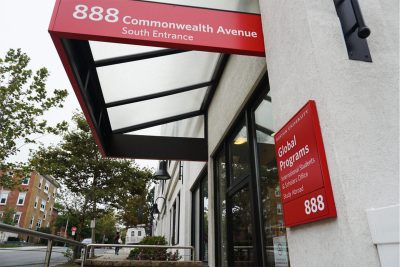
With coronavirus travel restrictions in place around the world, many international students at Boston University are left wondering if they’ll be able to return to campus in the Fall and how, if at all, their student visas will be affected.
When Cathy Dong, a graduate student in the College of Communication, asked BU’s International Students and Scholars Office if she would be able to learn remotely through the Learn from Anywhere program, a University staff member from ISSO wrote in an email that Dong may lose her F-1 student visa if she doesn’t return to Boston.
“At this time, there has been no accommodations made by [Student and Exchange Visitor Program] to allow students to maintain F-1 status by taking classes remotely from other places (including LA) in fall,” the email read. “As such, if you do not return in fall in person to the U.S., it will jeopardize your F-1 status.”
An F-1 visa allows international students to study at a U.S. educational institution in an academic program that will bring them toward a degree, diploma or certificate.
Dong, who will enter her third semester of graduate studies, may have to apply for a new F-1 and repay her international student fees if she does not return to the Charles River Campus in the Fall, the staff member wrote.
The email said she may also lose her eligibility for Optional Practical Training, a program that allows international students who have studied in the U.S. for two consecutive semesters to participate in up to 12 months of temporary employment or internships.
Dong had planned to study in Los Angeles before BU Study Abroad canceled her program, along with all other programs Wednesday. She said she hoped to instead take her classes remotely from L.A.
Since Fall will be her last semester at BU, Dong said she won’t be eligible for OPT once she graduates.
“My college mentioned that, for us, we can take a leave of absence in Fall semester, and then just return to campus for the Spring BU-L.A. program,” Dong said. “But then for us international students, that would mean we’re basically taking a semester of leave, and then that will ruin our opportunity to apply for OPT because after that we only have one semester left.”
Dong added that she wishes the ISSO had better communication with students and other departments at BU.
“It’s just a lot of lost information,” Dong said. “I honestly feel like the departments need to work together better and try to help their students better because right now, I feel like instead of helping me, my school is just really, don’t care about me and just letting me suffer.”
ISSO does not understand her experience as much as COM faculty, Dong said, which further complicates matters.
“When I’m talking to COM, of course, they understand my program better and they understand why LA is so important to me,” Dong said. “But then they can’t really help to override the [government’s] rule or anything like that.”
BU Spokesperson Colin Riley wrote in an email that universities are communicating with the U.S. State Department.
“Some questions are yet to be resolved, but the issue is front and center for colleges and universities,” Riley wrote. “We’re following it closely and working on behalf of our international students.”
Carissa Cutrell, acting deputy press secretary for U.S. Immigration and Customs Enforcement, which handles student visas, wrote in an email that the Student Exchange and Visitor Program has not yet issued an official statement to universities.
“We understand schools and international students have questions, and SEVP is actively working to issue guidance,” Cutrell wrote. “As soon as SEVP finalizes guidance for the fall term, the academic community will be updated.
Sunny Wu, a rising third-semester graduate student in COM, was also planning to study in L.A. through BU Study Abroad. She said she wishes there was more information from ISSO.
“A lot of students are forced to change their plans,” Wu said. “They’re trying to help but they don’t have any answers for us right now.”
President Donald Trump announced that his administration will not allow Chinese airlines to enter the U.S. effective June 16. This may make it more challenging, Wu said, to get back to Boston if she chooses to go home.
“These couple of days are probably our last opportunity to get an airplane ticket,” Wu said, “and now [BU is] like, ‘Oh, we don’t know anything yet.’ It’s kind of confusing.”
Tanish Shelar, a rising junior in the College of Arts and Sciences, said he isn’t sure if he’ll be able to return to BU from India due to travel bans, and that the potential need to reapply for a visa makes the decision more difficult.
“That would be a huge pain,” Shelar said. “Last time it took me three hours to just get through lines and cut through all of the legal tape and actually get to the interview.”





















































































































